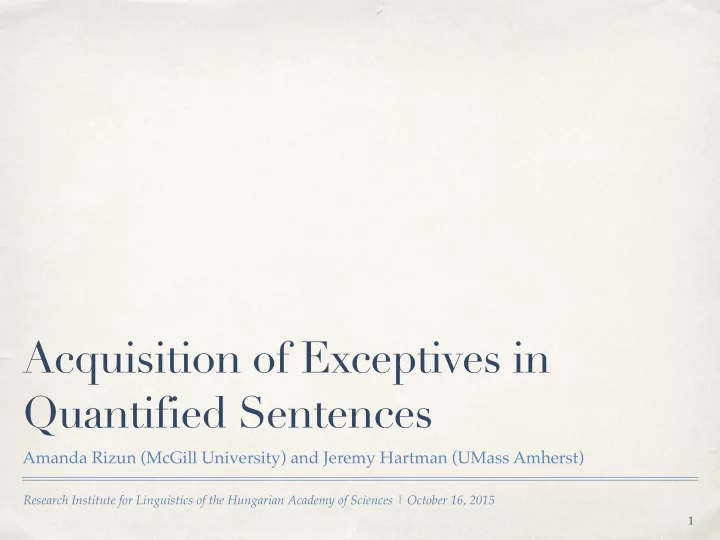

Acquisition of Exceptives in Quantified Sentences Amanda Rizun (McGill University) and Jeremy Hartman (UMass Amherst) Research Institute for Linguistics of the Hungarian Academy of Sciences | October 16, 2015 1
Overview Background Experiment Results Discussion and future work 2
What is an exceptive phrase (EP)? EP “Every girl ate cake except Mary ” “No student but John got an A on the exam” Non-–EP “I’d say I’m sorry, except I’m not.” (Tumblr) “This is just like CSpan, except I'm not bored.” (Legally Blond 2) “Proof I’m a Disney princess, except I’m a man” → "I was sleeping and you were sleeping beside me but I didn't know” (Childes) "I don't have the clothes but I want them” (Childes) 3
Distribution of EPs But only works in contexts with universal quantifiers (all, every, no) *Some students but John got an A on the exam (All/*Most/*Many*/*Three/*Some/None) of my friends but Chris went to the store. Compare: (1) Except for Joan, most cabinet members liked the proposal. (2) *But Joan, most cabinet members liked the proposal. (3) Every girl went to the store except Mary (4) Every girl went to the store but Mary (Examples von Fintel 1993) 4
Domain subtraction Domain subtraction: the exceptive subtracts a member(s) from the set that is being quantified over “Every student but John attended the meeting” - True “Every student attended the meeting” - False Attended: Didn’t Attend: Heather Kate Ben Fred Jill John 5
The uniqueness condition Attended: Didn’t Attend: Heather Kate Ben Fred Jill John Problem: if domain subtraction is the only thing that gives the meaning of exceptives, it lets us get incorrect interpretations In this scenario, “Every student but John and Jill attended the meeting” — False, but domain subtraction alone predicts that it should be true Domain subtraction just says that you need all the exceptions. In this case you do; you just also have another exception The Uniqueness Condition: the smallest unique set that makes the sentence true should be the exception set (exception set should contain only the exceptions). 6
Experiment Test both domain subtraction and uniqueness condition Use except rather than but Sentences like “Every student is at the meeting except Mary” Are domain subtraction and the uniqueness condition acquired simultaneously or separately? 7
Predictions Domain subtraction: the exception set must contain all of the exceptions in order to be judged true Scenario (1) = “Everyone is in the cave except Zazu” — True Scenario (4) = “Everyone is in the log except Rafiki” — False 1 4 8
Predictions (cont.) Uniqueness condition: the exception set must contain only the exceptions Scenario (3) = “Everyone is on the rock except Simba and Nala” — False Without uniqueness condition, domain subtraction would allow sentence to be judged True 3 9
More examples… (2) everyone is in the pool except Timon and Pumbaa (4) Everyone is in the woods except Olaf (3) Everyone is in the lake except Anna and Kristoff 10
Predictions (cont.) Prediction 1: if children understand domain subtraction, they will answer correctly given scenarios like (1) and (2) Prediction 2: children may answer both scenarios (3) and (4), or (3) but not (4), correctly. They may not answer (4) correctly and (3) incorrectly. 11
Participants and Materials 28 English-speaking children, ages 3;7 — 5;9; mean = 4;8 TVJT 9 conditions (picture-sentence pairs) 2 sets, for total 18 test items 6 filler items, 2 training Conditions (1) — (4) are the crucial test conditions Each child saw both sets in the same session; order of presentation of sets was counterbalanced, items within a set were randomized 12
Results Overall Accuracy For all age groups, 85.3% accuracy There was a significant effect of age between 3 & 4 (p < 0.0001), and 3 & 5 year olds (p < 0.0001). No effect of age between 4 & 5 year olds. Overall Accuracy by Age 3 y/o 4 y/o 5 y/o 68% 86% 92% Accuracy by Condition For 4 & 5 y/o groups, no significant difference was found between any of the conditions For 3 y/os, they did significantly worse on one of the bare quantifier sentences than on any of the other conditions (p < 0.01) 13
Results (cont.) There is no significant effect of condition even when analyzing only those subjects who had varied responses (13/28) 8 children performed better on scenarios like (3), and 3 performed better on scenarios like (4). To summarize — Prediction 1 is supported Prediction 2 is not supported 14
Discussion Overall, children perform very well on exceptives starting at a young age 3 y/os not good on sentences with just a quantifier (no exceptive), but why? Are domain subtraction and the uniqueness condition dissociated in the child’s developmental trajectory? No, but the potential is there if we include more test items on the crucial conditions per subject 15
Extensions and Future Work Presuppositions Fred came to see all the children except Mary Is Mary one of the children? (1) - Yes (2) - No 16
Extensions and Future Work Quantifier Spreading 1. Every cowboy is riding a horse (except one) A 2. A cowboy is riding every horse (except one) Without exceptive A: 1 = T, 2 = F B: 1 = F, 2 = T B With exceptive A: 1 = F, 2 = T B: 1 = T, 2 = F 17
In summary: Children understand quantified sentences involving exceptives at a young age It seems that two parts to the meaning of exceptives are acquired at the same time 18
Acknowledgments Thank you to Tom Roeper, Barbara Pearson, Tracy Conner, and Mike Clauss for feedback and suggestions! 19
Recommend
More recommend